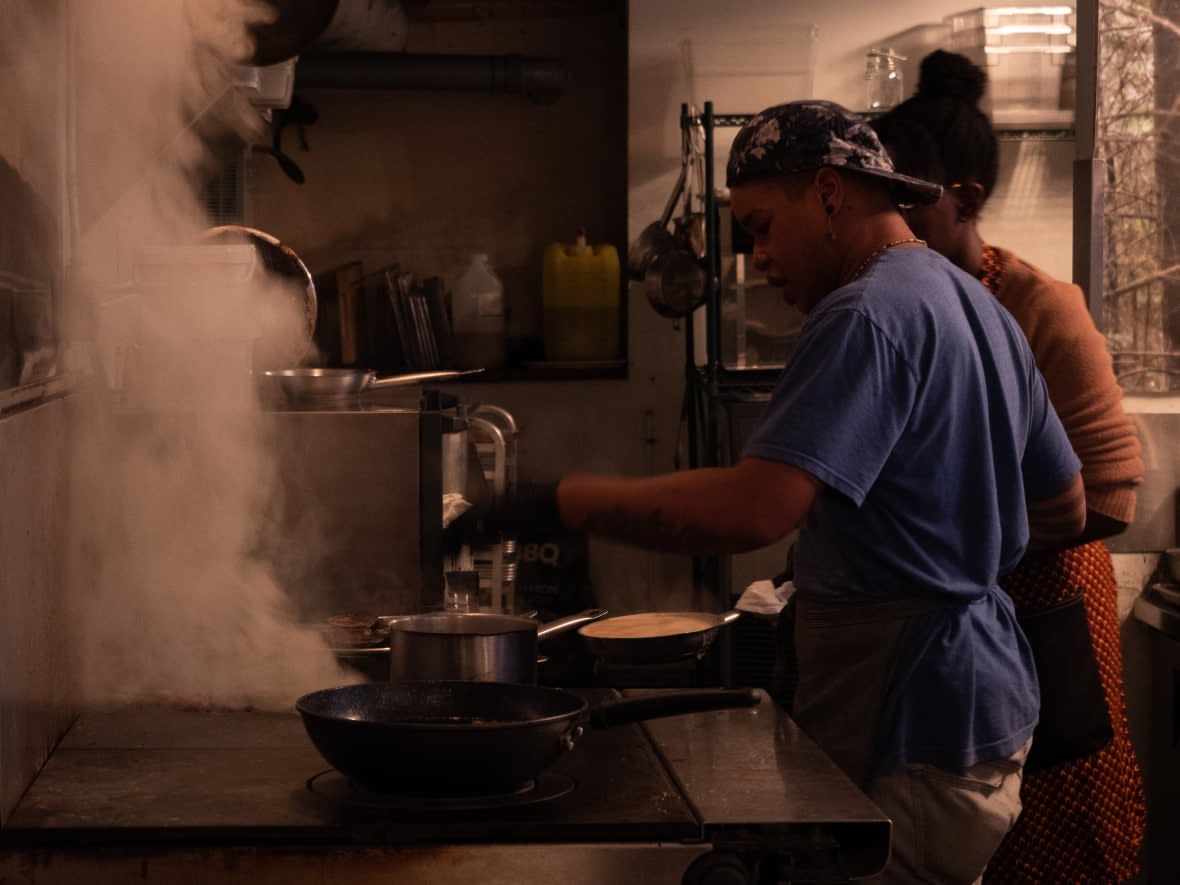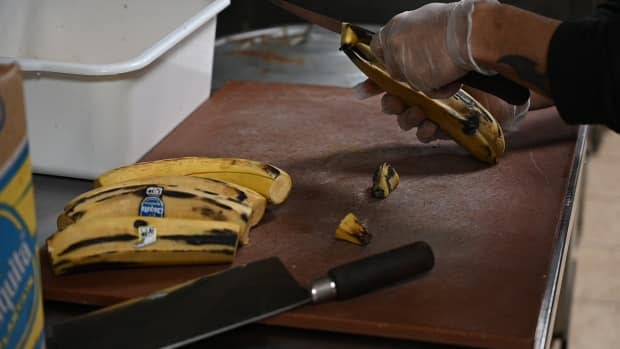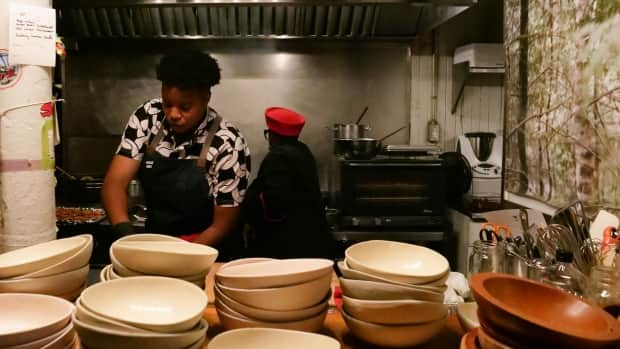Building community through food: Montreal non-profit supports emerging Black chefs

This story is a collaboration between Concordia University's journalism department and CBC Montreal.
Food sizzling on a hot pan, knives scraping against a cutting board, timers going off — the kitchen feels like a hive.
In the back of Restaurant Candide in Montreal's Little Burgundy neighbourhood, the cooks are hard at work preparing to host a fundraising event for DESTA Black Community Network.
The menu features dishes inspired by their Black diaspora heritage.
Scents of nutmeg, cardamom and cloves permeate the air as DESTA's food program co-ordinator and chef Berlin Reed brings cases of wine into the small restaurant that is beginning to bustle with guests.
Amid this effervescence, Reed can hardly contain his pride: all the chefs involved in preparing food for the event have been or are currently part of the food incubator program he founded.
"What I'm really trying to do is change the food system — build a Black food system. And that means not just passing free food out to clients," said Reed.
Participants join the incubator program for 10 weeks. DESTA then provides them with business consultations, mentors who work in the industry and food photographers. The program also lines them up with opportunities such as pop-up events for them to build their craft and clientele.

Located in Little Burgundy, the southwestern Montreal neighbourhood that was historically home to the city's Black community, DESTA is a non-profit organization that aims at reducing barriers to employment for Black youth. Its food incubator initiative was launched in 2020.
Reed, who works as a chef himself, aims to support Black and Indigenous chefs and food producers who have recently started their business, no matter how small. The program is offered free of charge to Black and Indigenous Montrealers.
Limitations in the food industry
A study released in February by Statistics Canada found that Black business owners in Canada accounted for 2.1 per cent of all business owners as of 2018, while census data shows 4.3 per cent of Canada's population is Black.
While the data shows a constant growth in Black-owned businesses, they tend to run into more challenges and have a lower profit margin than white and other racialized business owners, the study found.
For Black women, it can be even harder: the number of male business owners is more than double that of women.
"When you're neither a white person nor a man, you come off as sort of a unicorn in that environment, and trying to survive it can be really tough sometimes," said Evy Mendes, founder of Cantine Toca Toca, who went through the first cohort of the DESTA's food incubator program.
WATCH | Black women can feel like 'a unicorn' in a field dominated by white men
For Svens Telemaque, a Montreal speaker and author working to empower Black youth, the Canadian Black community faces this issue in many industries. He says economic barriers and a lack of representation are the main obstacles that Black youth face, making mentorship and support all the more essential.
"A lot of people in our community don't necessarily have very good starts," said Telemaque. "When you don't have a very good start, you just have more challenges. So, to have someone give you a hand, it makes success easier."
For Reed, the culinary industry is all the more difficult to navigate because of its high failure rate, which makes many entrepreneurial organizations reluctant to engage with chefs or food producers. He explained that, because of systemic barriers, these difficulties become more prominent for Black entrepreneurs.

As a result, many cannot envision themselves in this industry. Reed says the food incubator program is an opportunity to create the resources he wishes he had as a young Black chef.
Dave McKenzie, founder of the Community Service Initiative at the John Molson School of Business at Concordia University, has been involved in the program by giving financial and marketing advice to the participants.
He believes that supporting young Black chefs is crucial for both the market and the culture. He says there is a demand for multicultural food in Montreal, which is proven every day by the popularity of some of the restaurants that work in collaboration with DESTA.
For McKenzie, not only does the Black community benefit from the initiative, but the wider Montreal community, too. Through their cooking inspired by their cultural heritage, these young Black chefs help create a diverse food industry in the city.
'Priceless information and knowledge'
Historically, marginalized communities do not have the same access to funding nor to a network, elements that are vitally important in the culinary industry. Black male business owners' income before tax is $43,000 less than their white counterparts, according to a Statistics Canada research paper on Canadian Black business owners.
This is where DESTA steps in to bridge the gap. The goal is "to ultimately open more doors for entrepreneurs," says McKenzie.
Chef Marissa Leon-John, who was part of the program in 2020, is on the verge of launching her own line of spice blends. She said that the tools offered by DESTA were incredibly important to her start as a young entrepreneur in the food industry.

"Starting a business, it's hard to find the tools for accounting, for marketing and for social media and branding," said Leon-John. "And I found all those things through the DESTA food program. It's something I can't even put a dollar amount on because it has been priceless information and knowledge."
But Reed says there are limits to the program. Participants can sometimes access Candide's kitchen to prepare their products and food orders, but there is no kitchen space available on a full-time basis.
He says having a licensed commercial kitchen is critical when building a food business, but emerging entrepreneurs often do not have the funds necessary to rent one and DESTA too has yet to access the funding required for such a space.
In this fight together
Finding a place for food preparation is "one of the biggest barriers" to breaking into this industry due to the high cost of commercial rents, Reed says.
"We are a non-profit organization so it's about chasing the funding … and the desires of funders that don't necessarily always match with what the chefs need," he said.
Starting this year, DESTA will revamp the food incubator program in order to welcome more participants. Rather than everyone taking the same courses together, participants will be able to select courses around the skills they are looking to improve.
Reed is planning to offer four different classes, each of them with a capacity of three to five participants. He hopes to build more dynamic groups to continue creating community through food.
"If I know you and I like you, the first thing I want to do is understand what you want to eat and then cook something for you because that's how I connect with you. And they all share that same thing," said Reed about the chefs.
"It's like we're in this fight together."
For more stories about the experiences of Black Canadians — from anti-Black racism to success stories within the Black community — check out Being Black in Canada, a CBC project Black Canadians can be proud of. You can read more stories here.



